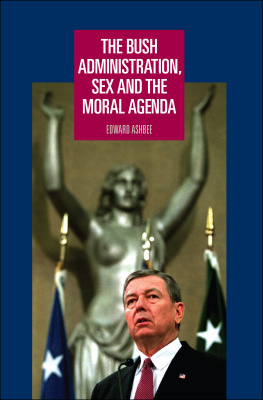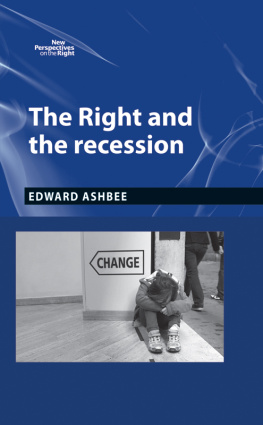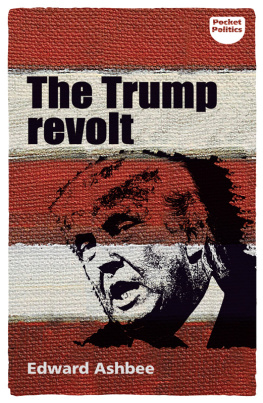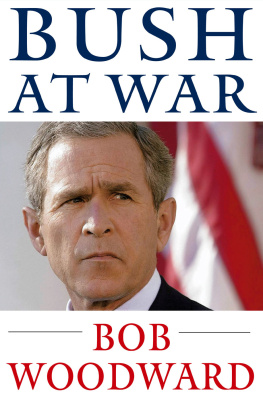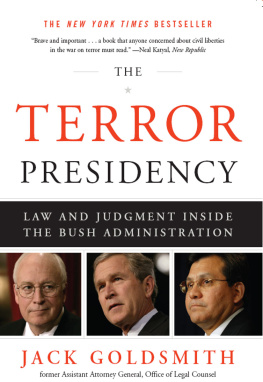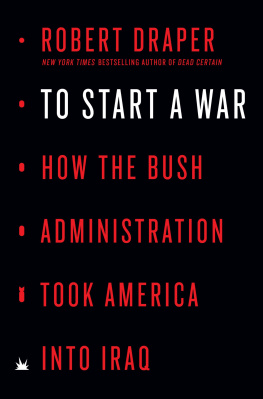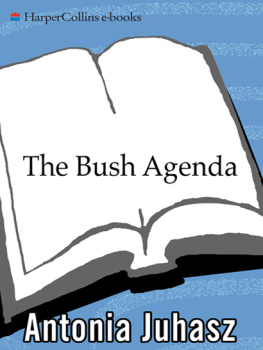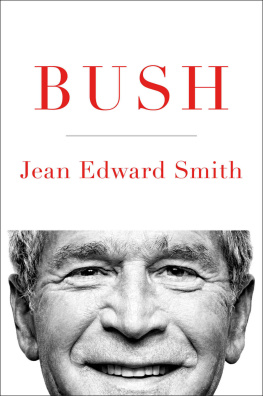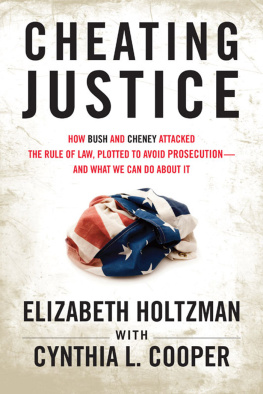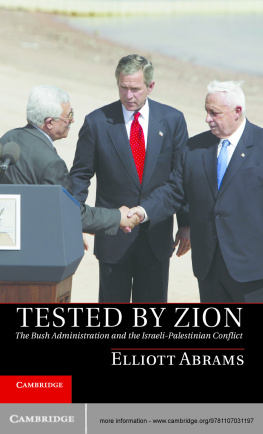The Bush administration, sex and the moral agenda
The Bush administration, sex and the moral agenda
Edward Ashbee
Copyright Edward Ashbee 2007
The right of Edward Ashbee to be identified as the author of this work has been asserted
by him in accordance with the Copyright, Designs and Patents Act 1988.
Published by Manchester University Press
Oxford Road, Manchester M13 9NR, UK
and Room 400, 175 Fifth Avenue, New York, NY 10010, USA
www.manchesteruniversitypress.co.uk
Distributed exclusively in the USA by
Palgrave, 175 Fifth Avenue, New York,
NY 10010, USA
Distributed exclusively in Canada by
UBC Press, University of British Columbia, 2029 West Mall,
Vancouver, BC, Canada V6T 1Z2
British Library Cataloguing-in-Publication Data
A catalogue record for this book is available from the British Library
Library of Congress Cataloging-in-Publication Data applied for
ISBN 978 0 7190 7276 5
First published 2007
16 15 14 13 12 11 10 09 08 07 10 9 8 7 6 5 4 3 2 1
Typeset in 10.5/12.5pt Charter
by Graphicraft Limited, Hong Kong
Printed in Great Britain
by CPI, Bath
Contents
Tables
Acknowledgements
I am grateful to the colleagues and friends who helped me develop the ideas and themes around which the book is based. They include Niels Bjerre-Poulsen, Martin Durham, Stephen Hurst, Anne Videkam, Duncan Watts and Andrew Wroe. I would also like to thank participants at conferences organised by the Center for the Study of the Americas at Copenhagen Business School, the American Politics Group of the Political Studies Association (UK), the Nordic Association for American Studies (NAAS), the British Association for American Studies (BAAS) and the European Association for American Studies for their questions, comments and suggestions. Their contributions helped me develop, modify and revise many of the chapters. They saved me from a number of pitfalls although I am, of course, entirely responsible for any errors and omissions that may remain.
Edward Ashbee
Center for the Study of the Americas
Copenhagen Business School
Preface
The Bush Administration, Sex and the Moral Agenda was completed in January 2006. There were important developments as the year progressed. Cultural conservatives were cheered when President Bush signed finally passed broadcast indecency legislation. They also claimed victories when courts in Washington, New York and California accepted that marriage should be restricted to heterosexual couples. The vote to incorporate the prohibition of same-sex marriage within the Alabama Constitution was passed overwhelmingly and the issue was placed on the ballot in eight other states. Although some pro-lifers saw the move as premature, South Dakota mounted a frontal assault on the 1973 Roe ruling by outlawing abortion except in cases of a threat to the mothers life.
Nonetheless, moral values campaigners also faced significant setbacks. While there were further Congressional votes on the Marriage Protection Amendment (as the Federal Marriage Amendment was now named in both chambers) and a restatement of support for the measure by President Bush, backing for it again fell far short of the two-thirds majorities that were required. Those who had campaigned against efforts to make Plan B (a morning-after pill) more widely available were also disappointed when, at the end of August, the Food and Drug Administration (FDA) finally approved over-the-counter sales for women aged 18 and older. There had been high hopes when measures making it a federal offence to assist an under-age girl evade parental notification laws by crossing state lines were passed in both chambers of Congress. However, the legislation was blocked at the final moment.
President Bushs weakened position created anxieties among cultural conservatives and, towards the end of the year, other developments added to these. Secretary of State Condoleezza Rices recognition of a same-sex partner at the swearing in of Mark Dybul as global AIDS coordinator was described as profoundly offensive by the vice-president of the Family Research Council. The scandal surrounding Congressman Mark Foley drew attention to the ambiguous position of many gay conservatives within the Republican Party and led USA Today to refer to the partys identity crisis. The publication of David Kuos book, Tempting Faith: An Inside Story of Political Seduction, increased tensions still further. According to Kuo, White House insiders had despite their public statements repeatedly dismissed the evangelicals associated with the Christian right as nuts and goofy. All these events and developments only confirm the contradictory and often paradoxical character of the approach taken by the Bush administration and the Republican Party towards the moral agenda.
Introduction: the Bush administration, sex and the moral agenda
Despite the passions of those who admire him, few US presidents seem to have attracted so much critical comment as George W. Bush. The opprobrium has been particularly pronounced outside the US. In Britain, the Daily Mirror asked in a headline published the day after Bushs November 2004 re-election victory: How can 59,054,087 people be so DUMB?
The presidents ratings are significantly better in the US, but his period of office has still provoked intense opposition. In November 2005, 35 per cent of those asked in a poll said that they had very negative feelings about Bush.
Much of this is driven by perceptions of US foreign policy and the Iraq war. From the perspective of the presidents opponents, both the Bush administration and the neoconservatives to whom it is seemingly bound are dedicated to imperial aggrandisement. There is, critics assert, a reckless disregard for the conventions of international relations and the interest of other nations. The hostility towards Bush is also directed, however, with almost equal vigour, towards his personality, the character of his faith and the policies that his administration has pursued within the US. The language that that has been used recalls the epithets From this perspective, the rhetoric of compassionate conservatism that underlay the Republicans 2000 election campaign was a mere marketing ploy. Bush represents corporate interests in their most unabashed and least inhibited form.
Religious faith
Nearly all the critiques of George W. Bush come together, however, in stressing the role of religion in shaping his thinking. He is, as is often noted, the most devout president since Jimmy Carter. However, while faith added a sense of innocence to representations of Carters character and personality, Bushs beliefs and ties have almost always been portrayed in a more threatening way. Indeed, it has been said that he is driven by messianic notions. From this perspective, White House policy towards both foreign affairs and domestic issues such as abortion, sex education and gay rights and the nomination of federal judges has been dictated by faith. In essence, some of the least restrained commentators assert, the administration has a theocratic character:



